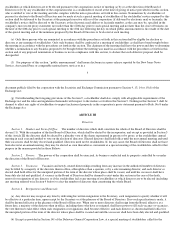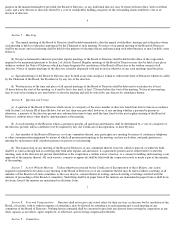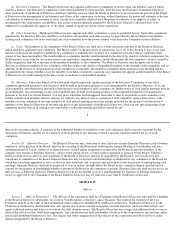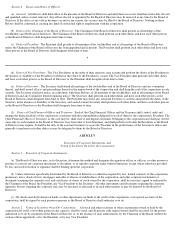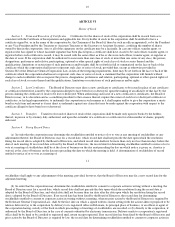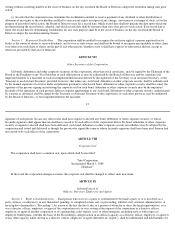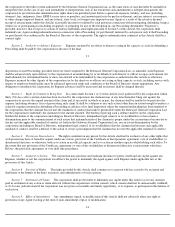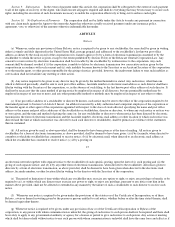Intel 2001 Annual Report Download - page 24
Download and view the complete annual report
Please find page 24 of the 2001 Intel annual report below. You can navigate through the pages in the report by either clicking on the pages listed below, or by using the keyword search tool below to find specific information within the annual report.
Section 2. Other Offices. The corporation shall also have and maintain an office or principal place of business at 2200 Mission
College Boulevard, Santa Clara, County of Santa Clara, State of California, and may also have offices at such other places, both within and
without the State of Delaware, as the Board of Directors may from time to time determine or the business of the corporation may require.
ARTICLE II
Stockholders' Meetings
Section 1. Place of Meetings.
(a) Meetings of the stockholders of the corporation shall be held at such place, either within or without the State of Delaware, as may be
designated from time to time by the Board of Directors, or, if not so designated, then at the office of the corporation required to be maintained
pursuant to Section 2 of Article I hereof.
(b) The Board of Directors may, in its sole discretion, determine that the meeting shall not be held at any place, but may instead be held
solely by means of remote communication in accordance with Section 211(a)(2) of the Delaware General Corporation Law. If authorized by
the Board of Directors in its sole discretion, and subject to such guidelines and procedures as the Board of Directors may adopt, stockholders
and proxyholders not physically present at a meeting of stockholders may, by means of remote communication (a) participate in a meeting of
stockholders; and (b) be deemed present in person and vote at a meeting of stockholders whether such meeting is to be held at a designated
place or solely by means of remote communication, provided that (i) the corporation shall implement reasonable measures to verify that each
person deemed present and permitted to vote at the meeting by means of remote communication is a stockholder or proxyholder; (ii) the
corporation shall implement reasonable measures to provide such stockholders and proxyholders a reasonable opportunity to participate in the
meeting and to vote on matters submitted to the stockholders, including an opportunity to read or hear the proceedings of the meeting
substantially concurrently with such proceedings; and (iii) if any stockholder or proxyholder votes or takes other action at the meeting by
means of remote communication, a record of such vote or other action shall be maintained by the corporation.
Section 2. Annual Meetings. The annual meetings of the stockholders of the corporation for the purpose of election of directors and
for such other business as may lawfully come before it, shall be held on such date and at such time as may be designated from time to time by
the Board of Directors, but in no event more than fifteen (15) months after the date of the preceding annual meeting.
1
Section 3. Special Meetings. Special meetings of the stockholders of the corporation may be called, for any purpose or purposes, by
the Chairman of the Board or the President or the Board of Directors at any time.
Section 4. Notice of Meetings.
(a) Except as otherwise provided by law or the Certificate of Incorporation, written notice (as the term "written" is defined in Article XII
hereof) of each meeting of stockholders, specifying the place, if any, date and hour of the meeting; the means of remote communications, if
any, by which stockholders and proxyholders may be deemed to be present in person and vote at such meeting; and purpose or purposes of the
meeting, shall be given not less than ten nor more than sixty days before the date of the meeting to each stockholder entitled to vote thereat,
directed to the stockholder in accordance with the procedures set forth in Article X hereof. Notice shall be deemed to have been given to all
stockholders of record who share an address if notice is given in accordance with the "householding" rules set forth in Rule 14a-3(e) under the
Securities Exchange Act of 1934, as amended ("Exchange Act").
(b) If at any meeting action is proposed to be taken which, if taken, would entitle stockholders fulfilling the requirements of Section 262
(d) of the Delaware General Corporation Law to an appraisal of the fair value of their shares, the notice of such meeting shall contain a
statement of that purpose and to that effect and shall be accompanied by a copy of that statutory section.
(c) When a meeting is adjourned to another time or place, notice need not be given of the adjourned meeting if the time and place, if any,
thereof, and the means of remote communications, if any, by which stockholders and proxyholders may be deemed to be present in person and
vote at such meeting, are announced at the meeting at which the adjournment is taken unless the adjournment is for more than thirty days, or
unless after the adjournment a new record date is fixed for the adjourned meeting, in which event a notice of the adjourned meeting shall be
given to each stockholder of record entitled to vote at the meeting.
(d) Notice of the time, place and purpose of any meeting of stockholders may be waived in writing, either before or after such meeting,
and to the extent permitted by law, will be waived by any stockholder by his attendance thereat, in person or by proxy. Any stockholder so
waiving notice of such meeting shall be bound by the proceedings of any such meeting in all respects as if due notice thereof had been given.
(e) Unless and until voted, every proxy shall be revocable at the pleasure of the person who executed it or of his legal representatives or
assigns, except in those cases where an irrevocable proxy permitted by statute has been given.















